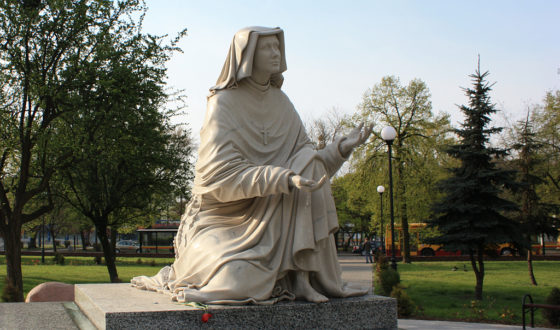The word “trust” in the school of St. Faustina’s spirituality describes the relation of man towards God, while the word “mercy” characterises interpersonal relations whose origin, model and motive lies in the merciful love of God. Jesus said to St. Faustina, “I require you to make acts of mercy, which are to come from your love for Me. You are always and everywhere to show mercy unto your neighbours; you may not withdraw, excuse or absolve yourself from this. I am giving you three ways of performing mercy to your neighbours: first, by deed; second, by word; and third, by prayer; these three levels cover the full scope of mercy, and it is unshakeable evidence that a soul loves Me. This is how the soul praises and honours My mercy”(Diary 742).
Nowadays there exists plenty of false conceptions of mercy, which are often identified with indulgence, pity, the denial of justice, therefore the proper and profound conception of mercy, which Sister Faustina had, deserves attention. Human mercy for St. Faustina is very strictly related with God’s mercy and so it is based on objective truth – the word of God; it sets up the fulfillment of the demands of justice, which is the basic limit of love and it fruits in concrete deeds. Mercy “is the flower of love” (Diary 651) or deed’s mercy (cf. Diary 651), Sister Faustina would write. In her life and in the writings witnessing of mercy towards neigbours must include first of all a dignity of needy man, and next his corporal and spiritual needs. A dignity of every man, given him through God already on the reason of creation and redemption, is this value, which is common for needy one and for person doing good. Noticing this dignity, given through God, in needy man and underlined by Christ, had an essential meaning for practise of mercy, and marks out the personalistic school of St. Faustina’s mercy from other models which appeared in the history of the Church.
In this interpretation, mercy – which has its source, model and motive in God, and which concetrates on man’s dignity – in Sister Faustina’s school of thought determines a style of life. Not only does it encompass sporadic or occasional acts of mercy performed towards those who are in need, but it also requires a Christian attitude towards the neighbour in all his dimensions, guided completely by merciful love. “I desire to be transformed completely into Your mercy – Sister Faustina prayed – and be a living reflection of You, O Lord; may God’s greatest attribute, His unfathomed mercy, pass through my heart and soul onto my neighbours” (Diary 163). This transformation of life into mercy denotes exactly an entire life-style, and not only one of its numerous features.
















